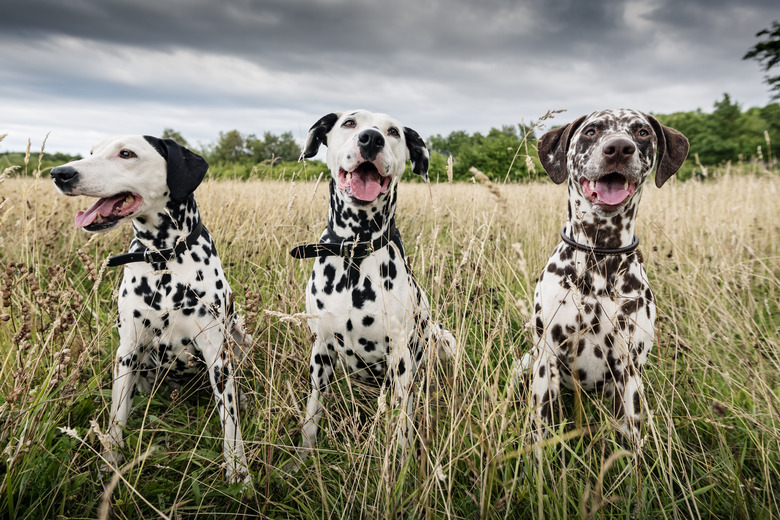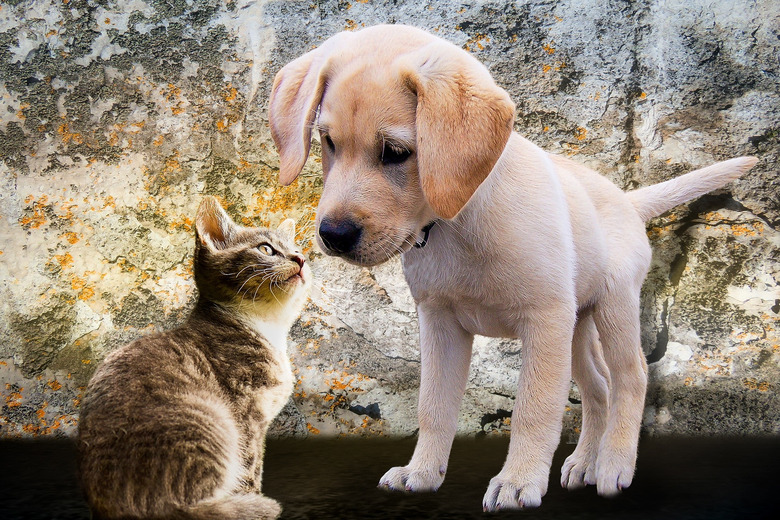Is My Dog Lonely Without Another Dog?
Dog parents are a lot like actual parents. Not only do they worry about meeting their pup's daily needs — like food, exercise and the understood daily cuddle quotient — they also worry about their dog's psychological needs. No parent wants their kid (or dog) in therapy someday blaming all of their issues on mom and dad, right? Even though our dogs can't actually grow up to say, "MOM I JUST FOUND OUT I SUFFER FROM ONLY CHILD SYNDROME, AND IT'S ALL YOUR FAULT," as dog parents, we still secretly worry about it.
One of the many questions that keep pet parents up at night: is it fair to just have one dog? Am I, as a human, enough for my dog? Does he need a furry brother or sister to play with and lean on in his times of only-another-dog-could-possibly-understand need (like when the living room is full of chew toys, but none of them are the right chew toy, and the humans just don't get it)?
Here's what you need to know about raising an only dog, and whether or not growing your furry fam is a good idea.
Do dogs get lonely?
Do dogs get lonely?
Maybe you're gone all day at work and worry about your dogs spending hours alone as house hermits. Maybe you work from home, but just can't give your dog the constant attention you'd like to. Whatever the reason, here you are, wondering if your dog needs another dog around 24/7.
MORE: Should You Leave the Radio or TV on for Your Dog?
Here's the short answer: Yes. Dogs get lonely. Anyone with a pet-cam and a functioning heart knows in their bones this is true.
Why do dogs get lonely?
Why do dogs get lonely?
On the most basic level, dogs get lonely because, like humans, they have feelings. A dog has the emotional range of a small child, which means that, even though they may not be able to process complex emotions like regret or pride, dogs definitely feel the basic emotions like sadness, anger, joy, disgust, anger, fear and contempt.
Loneliness is a kind of sadness (as anyone who has ever felt lonely can attest to) and dogs can definitely feel it. In addition to having a basic capacity for loneliness though, dogs are also prone to separation anxiety.
Dogs are pack animals by nature, meaning they're wired to crave and thrive off of social connections. Even as we've helped the wolf evolve into the modern day dog, we've kept them wired for social activity. Not only do we want our dogs to be social and play with us, historically, we've bred them to be social to work with us too. We specifically bred dogs to do different jobs (like a Labrador was bred to retrieve and a beagle was bred to help humans hunt) and now, well, we've mostly left the modern dog unemployed. So, in addition to feeling lonely if no one is around, your dog might also feel that useless feeling a human experiences when they're between jobs and question their purpose.
All of that combined adds up to a dog who might feel deeply lonely if left cooped up in a house alone all day.
Signs a dog is lonely.
Signs a dog is lonely.
If your dog is getting seriously lonely during the day, he'll let you know. Signs to look out for include a uptick or sudden beginning of destructive behavior—if your usually well-behaved dog has started using the bathroom inside or chewing up the sofa, they may be acting out and begging for attention. Other signs include a decreased appetite, loss of interest in favorite activities (like the walk he used to love), and the dog beginning to ignore you when you call. Left untreated, this can lead to your dog suffering depression, which is not something anyone wants.
Is my dog lonely without another dog?
Is my dog lonely without another dog?
Truthfully, your dog is lonely when he's alone. It's not necessarily about having another dog around — although a second dog may help.
"I can't look in the park and see a bird's eyeballs or smell a pheasant," Dr. Marty Becker, a veterinarian and coauthor of Chicken Soup for the Cat/Dog Lover's Soul, told PetFinder. "This is something dogs share. It's like being a woman and never being able to talk to or confide in another woman."
That said, another dog isn't the only thing that will fulfill a dog's social needs. If you don't have the time, money or space for another dog, you're not failing as a dog parent. There is a lot you can do to help your lonely dog (more on that later).
How do I know if my dog needs a companion dog?
How do I know if my dog needs a companion dog?
If you leave your dog home alone for long periods of time, or you suspect your dog is feeling lonely, he or she might benefit from a companion dog. Having another dog around means your pup won't ever have to feel like she's losing the social component that's so key to her pack-animal psyche, and it will alleviate your guilt if you're stuck working late.
MORE: How to Tell if a Dog Needs a Companion
If you have the time, money and space for a second dog, it's worth considering. However, it's never fair to bring a dog into your home if you're not equipped, in any way, to care for it. A second dog means twice as much food, twice as many groomer and pet-walker fees, twice as many trips to the veterinarian, and twice as much love and attention from you on the nights and weekends when you are around.
You're not the only part of the "should I get a second dog" equation, either. If your dog's loneliness has given way to full-blown separation anxiety, another dog might not be the best solution.
"If your dog has been diagnosed with separation anxiety, bringing in another dog is unlikely to solve the problem," said Dr. Rolan Tripp, an animal behaviorist, author and veterinarian at VCA-La Mirada Animal Hospital in La Mirada, California.
Instead of helping the first dog feel more adjusted, the new dog may just learn to mimic the lonely dog's anxiety, and then you have two anxious and potentially aggressive dogs on your hands. If your dog has been diagnosed with separation anxiety, Tripp stresses that it's important to introduce a second dog slowly, having them first meet and bond on neutral territory (like at a park) before the new dog moves in.
Tripp also suggests a kitten as a possible solution to lonely-dog syndrome. Again, slowly introducing the dog and the cat is key, but if they are given the time and space to get comfortable with each other, their bond can grow strong and alleviate your dog's loneliness in the long run.
How to find a friend for your dog.
How to find a friend for your dog.
If you decide that your situation just isn't right for a second dog, there's still plenty you can do to help your dog socialize with other dog friends when you're not around.
Look into doggie daycare, hiring a dog walker (a must for pet parents who work away from home all day) and finding neighbors with dogs who need friends. New York City-based veteran dog trainer and author Jodi Anderson recommends a combination of the above to create an "extended pack" for your dog.
"Twice a day with the dog walker and three times a week at day care," she suggests. "Dogs who have what I call 'extended packs' (dogs who live with their immediate pack but spend a good deal of time with other people, or outside pack members) are the quintessential latchkey dogs."
Lonely dog solutions
Lonely dog solutions
If your dog is feeling lonely and you can't get a second dog or trek your pup to and from doggy daycare on a regular basis, there are still options for you. You can surround your dog with toys, particularly puzzle toys that will stimulate the dog mentally and leave things that smell like you around for your dog to sniff when she's missing you a lot.
RELATED: Do This When Your Dog Destroys the House While You're Away
A regular dog walker is also highly recommended, especially if you're gone for several hours at a time. Finally, thanks to technology, you can interact with your dog throughout the day (and even feed him treats) with devices like PetChatz.
Always check with your veterinarian before changing your pet's diet, medication, or physical activity routines. This information is not a substitute for a vet's opinion.


